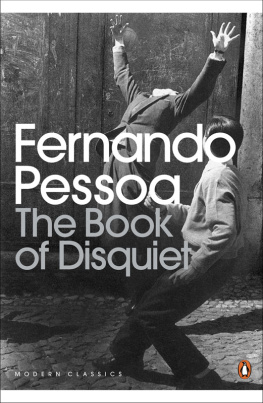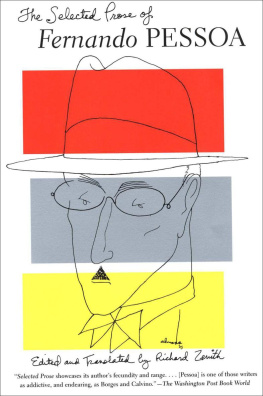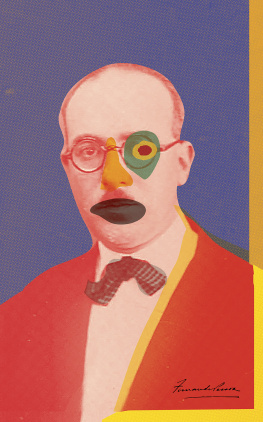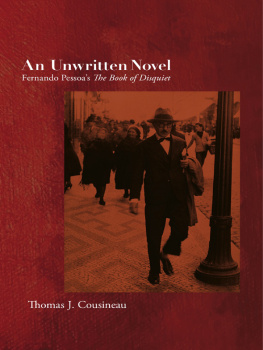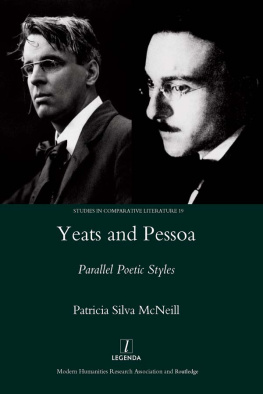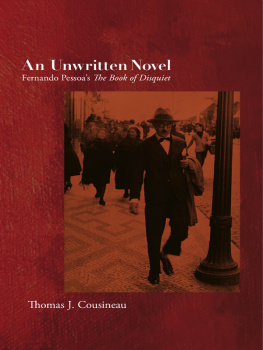Contents
PENGUIN BOOKS
THE BOOK OF DISQUIET
Fernando Pessoa (18881935) was born in Lisbonand brought up in Durban, South Africa. He returned to Lisbon in 1905. A prolific writer,ascribing his work to a variety of personas or heteronyms, Pessoa published little in hislifetime and supported himself by working as a commercial translator. Although acknowledged as anintellectual and a poet, his literary genius went largely unrecognized until after his death.
Richard Zenith lives in Lisbon, where he works asa freelance writer, researcher and translator. He has edited and translated many works byFernando Pessoa, including A Little Larger Than the Entire Universe Selected Poems andThe Selected Prose of Fernando Pessoa.
Acknowledgements
Im grateful to Maria Aliete Galhoz forhaving broken the ground, with her patient work in the Pessoa archives; to Jos Blanco for hisenthusiasm, support and friendship; to Michael Schmidt for believing in Pessoa when few hadheard of him; to Hermnio Monteiro and Lcia Pinho e Melo for their good work and encouragement;to Jennifer Hengen and Simon Winder for having, in a certain way, gone out on a limb; to EllahAllfrey for her inspired suggestions; and to the staff workers at the National Library ofPortugal and the Casa Fernando Pessoa for their gracious assistance.
I especially thank Teresa Rita Lopes and ManuelaParreira da Silva for their generous help in deciphering the original manuscripts; Manuela Nevesand Manuela Rocha for their similar generosity in helping me interpret difficult passages; andMartin Earl for his insightful critique of my Introduction.
I.
Texts Citing the Name of Vicente Guedes
As explained in the Introduction, VicenteGuedes was for many years the fictional author of The Book of Disquiet, until he wasreplaced by (and absorbed into) Bernardo Soares. Perhaps to avoid confusion, Pessoa excludedthe following three passages from the large envelope where he left material forDisquiet.
It was entirely by chance that I got to knowVicente Guedes. We often ate at the same quiet, inexpensive restaurant. Since we knew each otherby sight, we naturally began to exchange silent greetings. One day we happened to be seated atthe same table and we traded several remarks. A conversation ensued. We began to meet thereevery day, both for lunch and dinner. Sometimes we would leave together after dinner and strollaround for a while, talking.
Vicente Guedes endured his utterly grey lifewith the indifference of a master. A stoicism for the weak formed the basis of his entire mentaloutlook.
His natural temperament had condemned him to haveevery conceivable yearning; his destiny had led him to give them all up. Ive never knownanother soul that startled me more. Without any kind of asceticism to spur him on, this man hadrenounced all the goals to which his nature had predisposed him. Born to beambitious, he took languid pleasure in having no ambition at all.
this gentle book.
This is all that remains and will remain of oneof the most subtly passive souls and one of the purest, most profligate dreamers that the worldhas ever known. I doubt that any outwardly human creature has lived their consciousness of selfin a more complex fashion. A dandy in spirit, he promenaded the art of dreaming through therandomness of existing.
This book is the autobiography of a man who neverexisted.*
No one knows who Vicente Guedes was or what hedid or .....
This book is not by him: it is him. But let usalways remember that, behind whatever these pages tell us, something mysterious slithers in theshadows.
For Vicente Guedes, to be conscious of himselfwas an art and a morality; to dream was a religion.
He was the definitive creator of inneraristocracy that posture of soul which most resembles the bodily posture of a thorougharistocrat.
The anguish of a man afflicted by lifestedium on the terrace of his opulent villa is one thing; quite another is the anguish of someonelike me, who must contemplate the scenery from my fourth-floor rented room in downtown Lisbon,unable to forget that Im an assistant bookkeeper.
Tout notaire a rv des sultanes*
Every time Im obliged by some official actto state my profession, I smile to myself at the irony of the undeserved ridicule when I declareOffice clerk and no one finds it at all strange. I dont know how it got there, but thats how my name appears in theProfessional Register.
Epigraph to the Diary:
Guedes (Vicente), office clerk, Rua dosRetroseiros, 17, fourth floor.
Professional Register of Portugal
II.
Two Letters
Pessoa planned to insert phrases and ideasfrom the following letters in The Book of Disquiet. This intention is clearly statedin the second letter, while the first letteror rather, Pessoas typed copy ofitwas marked B. of D. at the top.
Letter to hismother 5 June 1914
My health has been good and my state of mind,oddly enough, has improved. Even so, Im tortured by a vague anxiety that I dontknow what to call but an intellectual itch, as if my soul had chicken-pox. Its only inthis absurd language that I can describe what I feel. But what Im feeling isnt thesame as those sad moods I sometimes tell you about, in which the sadness has no cause. Mypresent mood has a definite cause. Everything around me is either departing or crumbling. Idont use these two verbs with gloomy intent. I simply mean that the people I associatewith are or will be going through changes, marking an end to particular phases of their lives,and all of this suggests to me as when an old man, because he sees his childhood companionsdying all around him, feels his time must be near that in some mysterious way my life likewiseshould and will change. Not that I think this change will be for the worse. On the contrary. Butits a change, and for me a change to pass from one state to another is a partialdeath; something in us dies, and the sadness of its dying and its passingon cannot help but touch our soul.
Tomorrow my best and closest friend* is leavingfor Paris not for a visit but to live there. And Aunt Anica (see her letter) will probablyleave soon for Switzerland with her daughter, who will be married by then. Another good friendis going off to Galicia for a long while. Still another fellow, my next best friend after thefirst one I mentioned, is going to Oporto to live. Thus everything in my human circle is comingtogether (or apart) to force me either into isolation or else onto a new, uncertain path. Eventhe circumstance of publishing my first book will alter my life. Ill lose something:my unpublished status. To change for the better, because change is bad, is alwaysto change for the worse. And to lose a defect, or a deficiency, or the status of being rejected,is still a loss. Imagine, Mother, how someone who feels this way must live,overwhelmed by such painful daily sensations!
What will I be ten years from now, or even five?My friends say Ill be one of the greatest contemporary poets they say this based onwhat Ive already written, not what I may yet write (otherwise I wouldnt mentionwhat they say ). But even if this is true, I have no idea what it will mean. I have no ideahow it will taste. Perhaps glory tastes like death and futility, and triumph smells ofrottenness.
Letter to Mrio de S-Carneiro 14 March 1916
Im writing you today out of an emotionalnecessity an anguished longing to talk to you. I have, in other words, nothing special to say.Except this: that today Im at the bottom of a bottomless depression. The absurdity of thesentence speaks for me.

